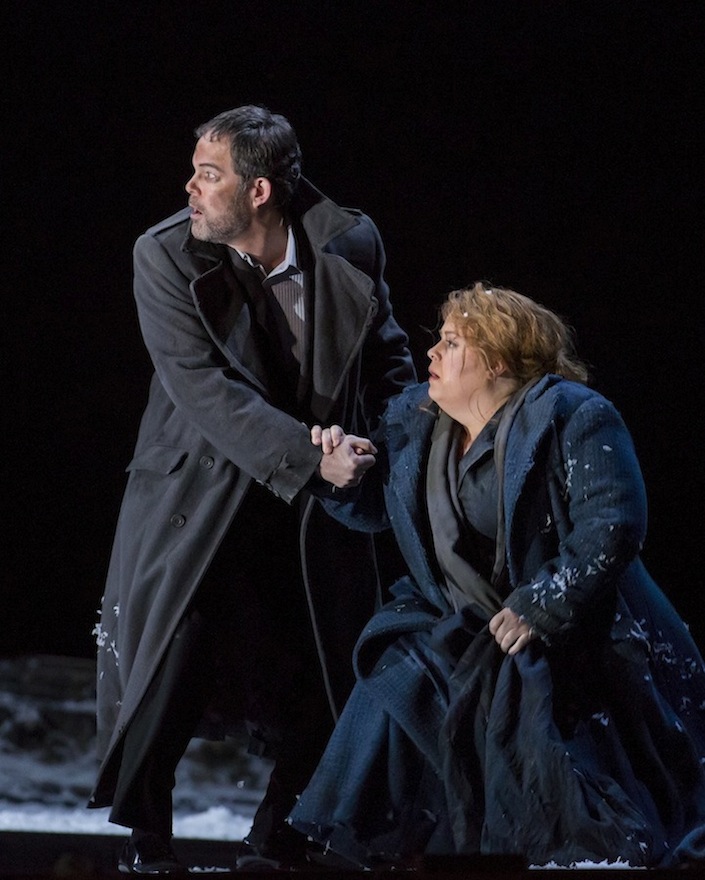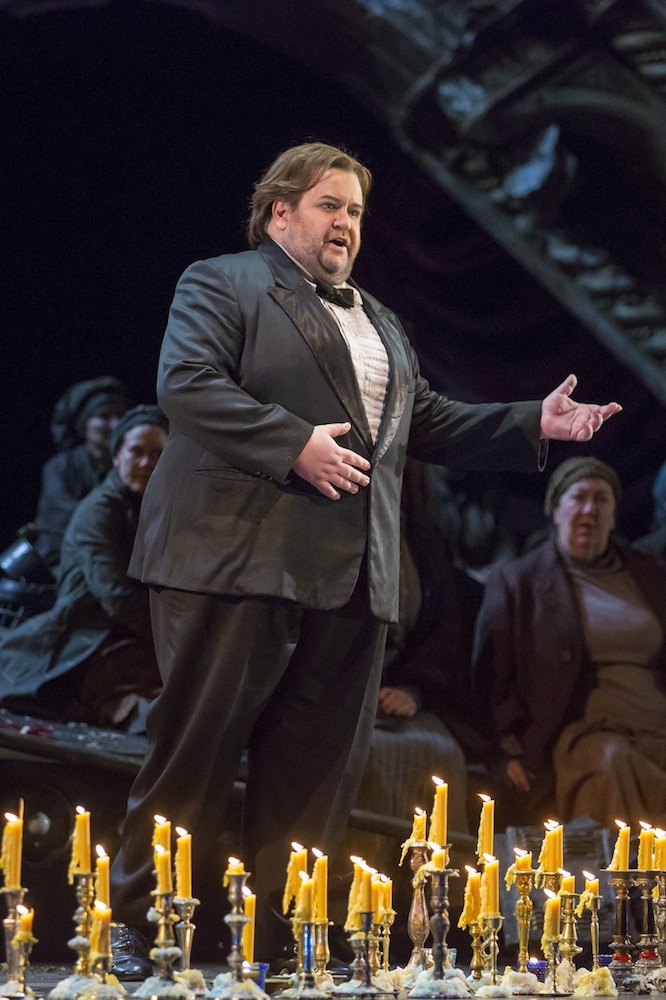Magnificent singing triumphs over drab, postmodern staging in Lyric’s “Tannhäuser”
Coming between The Flying Dutchman and Lohengrin, Tannhäuser stands as a sort of way-station for the themes and elements that Wagner would develop in the years and operas to come: the plight of the solitary outcast, the conflict between sacred and profane love, a quest for spiritual redemption, and even a pre-Meistersinger sing-off between knights. The opera also contains some of Wagner’s most indelible inspiration from the stirring overture to Elisabeth’s arias and Wolfram’s “Song to the Evening Star.”
The Lyric Opera of Chicago opened its first production of Tannhäuser in 26 years Monday night at the Civic Opera House. While the opportunity to create an unforgettable Tannhäuser was squandered by an unremittingly ugly, postmodern production, the singing was magnificent from top to bottom, and managed to carry the day. But so low were the low moments it was often a tossup as to which would prevail.
The evening began on a surreal note with an intrusive Terpsichorean pantomime during the overture depicting the sensual charms of the Venusberg. Instead of amorous nymphs and shepherds we have male dancers in formalwear getting lap dances from women in evening gowns. Clothes are shed and they cavort about in twisting, undulating moves evoking memories of the Solid Gold dancers, the shirtless chorus boys jumping and tumbling over a large banquet table. If I wanted to see The Boys From Syracuse, I would have bought a ticket.
Mercifully, that was the appalling low point but the dark, post-apocalyptic Royal Opera House staging by Tim Albery and Michael Levine makes Lyric’s concurrent bleak Tosca seem like Annie. Far from being edgy or original, the staging catalogs virtually every trendy revisionist opera cliche of the past two decades.
In the postmodern style, Levine’s empty scenic design is perversely apposite Wagner’s detailed instructions. The Venusberg is a stage within a stage with a golden proscenium arch, Venus enticing Tannhäuser on the same raked banquet table. The gleaming Wartburg hall is an empty barren landscape of bombed-out rubble and overturned chairs on which the principals sit for extended periods. (Did some of the heavyset singers need to take a load off?)
The Christian knight-singers are dressed as gun-toting mercenaries who (apparently) shoot the Shepherd boy for no good reason. Jon Morrell’s drab, gray-green costumes are the opposite of visual resplendence—the guests look like scruffy refugees, while the knights wear ill-fitting tuxedos for the song contest. (If you plan to go, buy a cheap seat, since David Finn’s inexplicable lighting is so dark you can barely see past the 15th row.)
And, of course, as in last season’s Parsifal, the Christian iconography that is such a central part of the opera is entirely absent. One would have no idea that spirituality had anything to do with the scenario were it not for the supertitles, which were about the only thing in this hapless production that respected Wagner’s intentions.
What a wasted opportunity. The one thing that could save this misconceived production is some world-class Wagner singing and, fortunately, that’s exactly what this stellar cast served up in spades.
In the title role of the conflicted knight minstrel torn between the sensual pleasures of Venus and the pure religious love of Elisabeth, Johan Botha offered his finest Lyric performance to date. Botha was in supreme voice opening night, singing easily with his big, gleaming tenor secure, powerful and evenly produced ringing out with impressive impact. He delivered an impassioned rendering of Tannhäuser’s ode to Venus and, at the end of the long evening, had ample stamina in reserve for the extended pilgrimage narration of the final act, with only a hint of fatigue palpable. Botha has been justly criticized for his stolid stage presence in the past, but his Tannhäuser was a much more energized and dramatically engaged figure, as much as the staging allowed.

With her impressive performance as Elisabeth, Amber Wagner showed that she is coming into her own as a complete, major artist. She sang with creamy, resplendent tone throughout, with an imposing “Dich teure Halle,” and plumbing a striking emotional depth in Elisabeth’s prayer. Most importantly, she brought a credible dramatic urgency to a character that can easily become a saintly cardboard archetype.
There appeared to be some sort of staging glitch opening night at Venus’s return in Act 3, which was handled smoothly by Michaela Schuster. The German mezzo-soprano made a worthy temptress, singing with ample fruity tone, an intermittent wobble apart.
The nearly pitch-black stage and lack of visual clarity virtually defied anyone to create a convincing characterization. But Gerald Finley succeeded more than anyone in creating a fully rounded character, and his Wolfram was a masterful work of dramatic singing. The Canadian bass-baritone brought a human quality to Tannhäuser’s rival for Elisabeth’s hand—endearingly shy and self-conscious in the song contest yet strong in his denunciation of Tannhäuser in Act 3. Wolfram’s “Song to the Evening Star” was a highlight—poised and limpid, sung by Finley with beautiful burnished tone and the expressive detailing of a great lieder singer (which Finley is, as well).
Even though his goofy hunter getup afforded little dignity as the Landgraf, John Relyea anchored the ensemble at the low end with his sonorous bass. Of his ragtag band, Jesse Donner was a vibrant Walther and Daniel Sutin a light-voiced Biterolf with capable turns by Corey Bix as Heinrich and Richard Wiegold as Reinmar. Angela Mannino had the right boylike timbre for the Shepherd.
There were some brass lapses early in the evening and the climax of Act 1 felt strangely underplayed by Davis. After that both conductor and orchestra were in the Wagner zone, with gorgeous playing, big ensembles well-balanced and thrilling, and the woodwinds bringing great refinement and tonal beauty to the interior moments. Special kudos to harpist Marguerite Lynn Williams, whose prominent playing was stellar throughout the long evening.
Michael Black’s chorus delivered on the same superior level as the principals. It’s too bad all of these fine artists weren’t provided with a production worthy of their talent.
Tannhäuser runs through March 6. lyricopera.org; 312-827-5600.
Posted in Performances






Posted Feb 11, 2015 at 9:28 am by Peter Borich
Yep…. The apparent shooting of the Shepard Boy near the end of Act One was sheer stupidity, unless the knights were making some sort of critical statement about his singing…..
Posted Feb 17, 2015 at 3:31 pm by Anne-Marie
Terrible staging! The beauty of the overture was, in my mind, marred by the hideous cavorting of half-naked bodies on the table and all over the stage. Once again, where has subtlety gone? Must we be subjected to “in your face” excess that leaves no room for our imagination? Is there no other, more creative way to show the sensuality of the Venusberg other than these overtly sexual gymnastics? I thought I was watching a preview of “Fifty Shades of Grey”!
You are right, the singing was sheer beauty to the ears and soul.
Other patrons had the same impression — both the younger generation and the more seasoned ones.